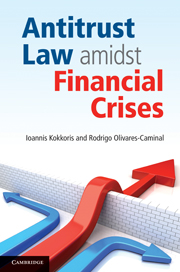Book contents
- Frontmatter
- Contents
- Foreword by Philip Lowe
- Foreword by Frederic Jenny
- Preface
- Table of cases
- Table of treaties and other international instruments
- Introduction
- 1 Introduction to competition law: EU, US and UK
- 2 Some notes on crises
- 3 Failing-firm defence
- 4 Efficiencies
- 5 Crisis cartels
- 6 State aid (Phedon Nicolaides)
- 7 Competition enforcement in periods of crisis
- 8 Conclusion
- Index
Foreword by Philip Lowe
- Frontmatter
- Contents
- Foreword by Philip Lowe
- Foreword by Frederic Jenny
- Preface
- Table of cases
- Table of treaties and other international instruments
- Introduction
- 1 Introduction to competition law: EU, US and UK
- 2 Some notes on crises
- 3 Failing-firm defence
- 4 Efficiencies
- 5 Crisis cartels
- 6 State aid (Phedon Nicolaides)
- 7 Competition enforcement in periods of crisis
- 8 Conclusion
- Index
Summary
The recent financial and economic crisis has created significant challenges for the economy and for business, as well as for policy-makers. Competition policy has a central role to play in responding to the crisis and, as Dr Kokkoris and Dr Olivares-Caminal discuss in their extremely timely book, competition authorities around the world have faced their own specific challenges.
In the face of wholesale government intervention in the market, the European Commission's objective in ensuring compliance with EU competition rules, and specifically the rules on state aid, has been to help maintain a level playing field in the European financial sector, and to help preserve the achievements of the single market. At the outset of the crisis we sought to ensure that rescue measures respected fundamental competition principles by setting out how we would apply state aid rules in the Commission's four Communications on rescue and restructuring of the financial sector. And the introduction of the Temporary Framework for state aid provided member states with the necessary flexibility to act to target specific problems within their territory by facilitating programmes of access to finance for the real economy. These measures were key in ensuring the coherence of rescue and recovery measures across the EU and, crucially, helped keep any disruptions to the level playing field to an absolute minimum.
- Type
- Chapter
- Information
- Antitrust Law amidst Financial Crises , pp. x - xiPublisher: Cambridge University PressPrint publication year: 2010



